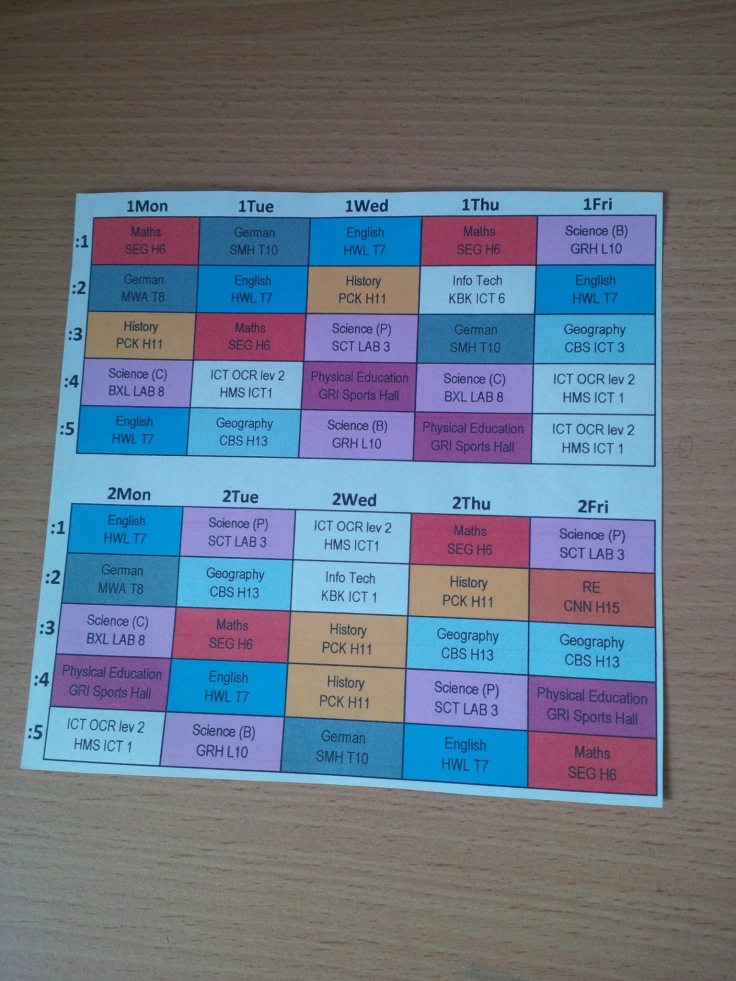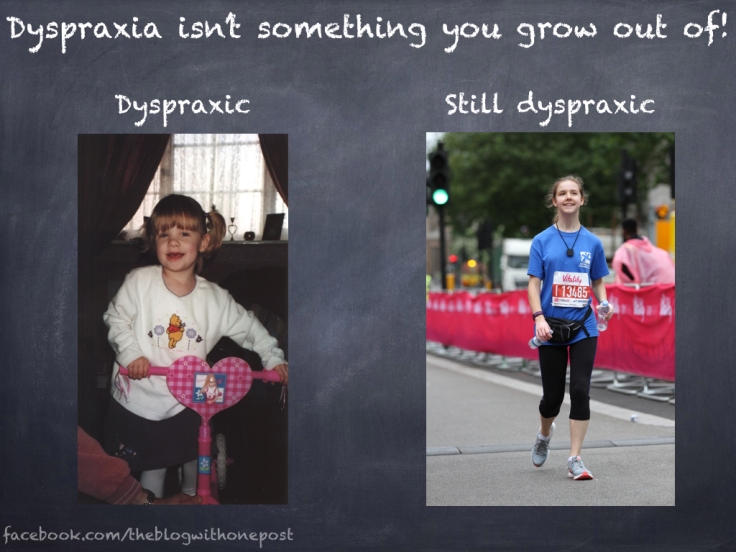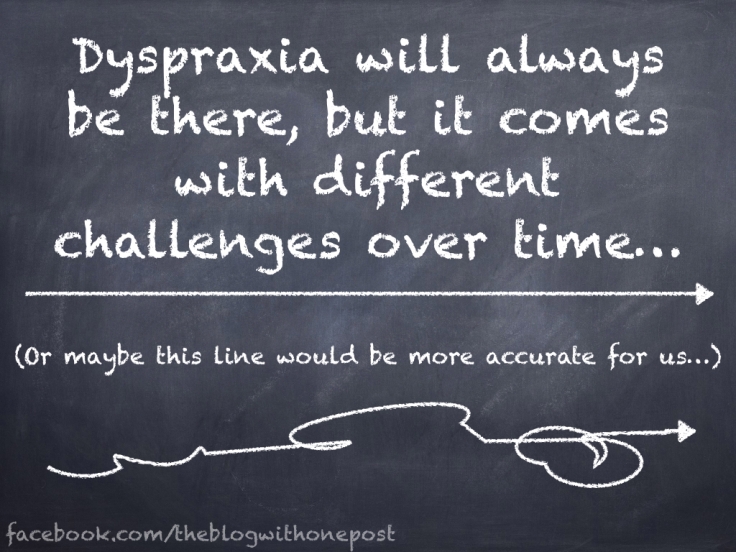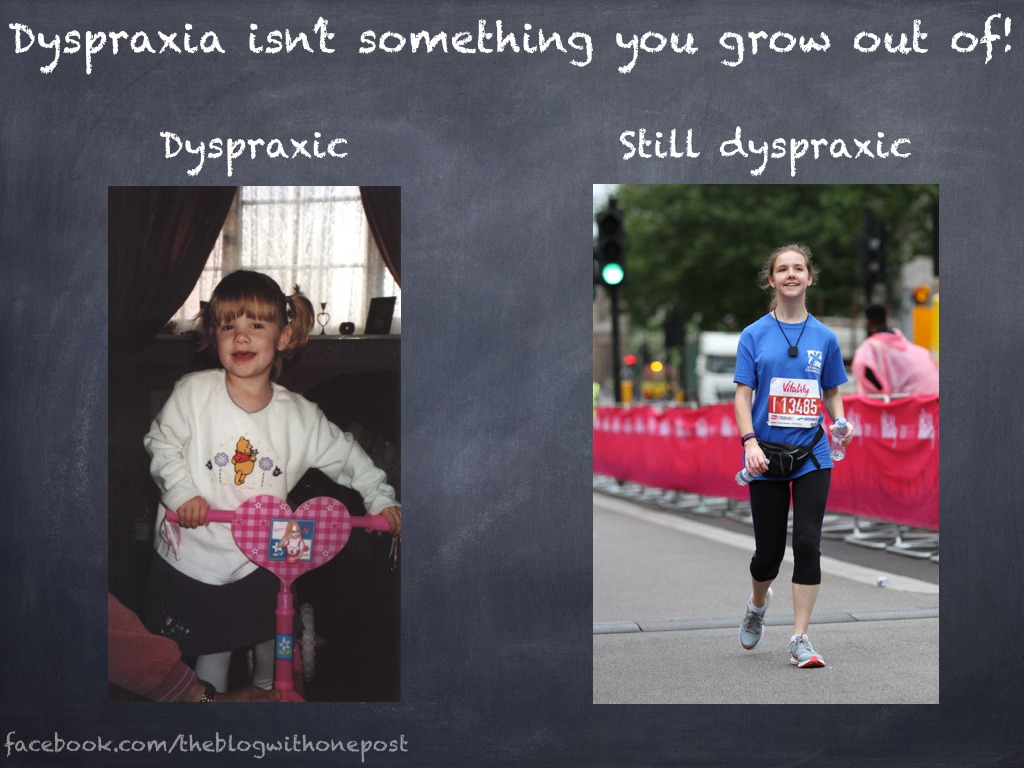Something I’ve noticed over the years is that my dyspraxia affects me differently. It’s not the dyspraxia itself that changes – dyspraxia isn’t a condition that gets progressively worse or better – it’s the environment and the challenges that come with that environment.
For example, the school environment had a lot of structure to it. There would be a timetable which I could go through to plan exactly what books I would need to take in that day. At that age there wasn’t very much outside of school that I needed to be organised about. This meant that I came across as being quite organised – this was something teachers would even point out in parents’ evenings etc. I would always remember the books I needed to take in that day. I think there were only one or two occasions where I forgot my planner or pencil case! Yet now organisation is something I really struggle with!

There’s so many more things to think about now that don’t have a structure to them, whether it’s making a phone call or replying to an email. I know I should make use of reminders on my phone more, but often I find I forget to set a reminder in the first place!
Whilst I was in primary school I would notice that I was the last one to finish the race on sports day, but I wouldn’t notice how I struggled socially. As you get older you tend to become more self-aware of how your dyspraxia affects you, I think that’s the same for any disability. It can seem as though you’re struggling with more – sometimes I think “I don’t remember finding this difficult when I was younger”, but in fact it’s that when I was younger I didn’t realise I did certain things differently to my peers. I didn’t really understand how dyspraxia affects me in social situations until I was in secondary school.
Perhaps this self-awareness could be part of the reason why many people aren’t diagnosed with dyspraxia until they are much older (although I still think one of the main reasons is due to lack of awareness). Another reason could be education. It’s been mentioned to me that lots of people don’t realise how their dyspraxia affects them until further up in education when it gets more challenging and they realise how it affects their working memory, thought processing etc. This could make sense as to why many people are diagnosed as being dyspraxic whilst studying at university. Personally, although I was diagnosed as dyspraxic at an early age I didn’t really fully understand how it affected me academically until I was doing my GCSE’s.
One example I remember was in school in year nine when I started using a laptop in lessons. Someone asked me why I used a laptop and I explained why and they were confused as I didn’t use one in year seven or eight. It wasn’t that my dyspraxia had suddenly got worse, it was because in the lower years we did less writing. So, yes, I still struggled with my hand-writing before, but as the volume of writing required got bigger it was something I struggled with even more, finding it harder to keep up.
Whilst the academic subjects get harder as the years go on, physical subjects like P.E. stop when you get to the end of year 11 (unless you take it as a further option). This means that you’re not compared to your peers so much in terms of your physical ability, so you’re not reminded of the fact that you find it difficult to catch a ball, for example. For this reason you may not notice the gross motor affects of dyspraxia so much anymore.
Dyspraxia is not something you ever grow out of – dyspraxic children grow up to become dyspraxic adults, but over time there may be certain coping strategies you develop to help with certain things. This might mean you don’t notice certain difficulties as much. An example is shoe laces. I used to struggle with my laces, but now I use laces with a magnetic closure. So although I know that I do find shoe laces difficult, I don’t necessarily experience that difficulty now.

However, as you get older there are different challenges that arise as you start to become more independent – things like making phone calls. Something else that I’ve noticed as I’ve got older is how a lot of things that are involved with being independent seem to come so much more easily to others. I’ll often find myself asking others how to do things that other people seem to know how to do straight away.
In addition to the long-term differences, there are also differences from day to day. Although earlier I said that dyspraxia itself never changes, there are some days that can be ‘typical dyspraxic days’ where everything seems to happen 10x more than normal – constantly tripping over, dropping things, getting words muddled up. This can be made worse by being tired or stressed.
Dyspraxia is never something that can be grown out of, it will always be there, but it comes with different challenges over time.

Oh and for those of you who might find it amusing, seeing as we’re talking about dyspraxia over time, here’s a video my dad made for my 18th birthday last year. Spot the dyspraxic moments! 😉
Natalie 🙂

All of this is so spot on! I can’t seem to view your vid chick?
LikeLike
Thanks! How strange, what does it say?
LikeLike
Oh, it’s there now. Must have been my internet perhaps?! Very cute compilation ^_^
LikeLike
Oh that’s good, haha 🙂
LikeLike
I was diagnosed with this around 12 years old and my mom said I grew out of it. Does that mean I never had it to begin with and I was just a clumsy child who needed to watch herself and where she was going and be more careful and be more aware? I did occupational therapy and I quit dropping stuff often in my early adulthood. Or is it still there and I just got better?
LikeLike
Hmm, dyspraxia is never something you grow out of, but if you were diagnosed with it then I doubt you never had it to begin with. Maybe your symptoms are just much more mild now? It’s hard to say, as I don’t know you personally
LikeLike
Did it get better as you get older like are there things you can do now you used to not be able to?
LikeLike
In a way. But then they are things that get better as you get older anyway and often you work out your own way of doing certain things. For example, tying shoe laces is something I still struggle with as I can’t do them tight enough and it sometimes takes me more than one attempt, but when I was younger I used to not be able to do shoe laces at all.
LikeLike
I see it as combination of developing motor-memory, as well as finding coping strategies. With things like dropping glasses for example, I became wise to the fact that I should always hold it with my my thumb and forefinger grabbing it like a claw whilst keeping my little finger underneath to prevent the glass from slipping out, the rest of my fingers I use for control.
LikeLike
Yeah that’s true, good way of describing it 🙂
LikeLike